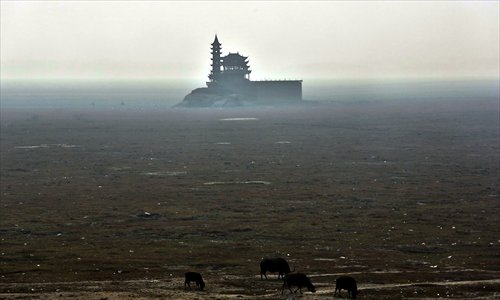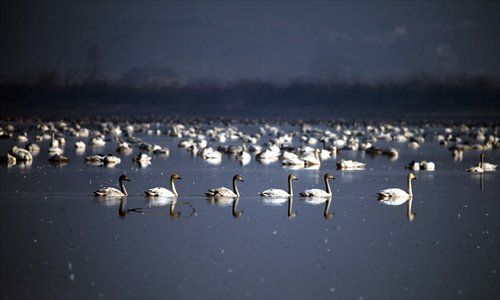Lake of drought

Buildings on a dried up small island in Poyang Lake, in Jiujiang, Jiangxi Province, January 19, 2014. Photo: CFP
Zhan Fangfang couldn't believe her eyes when she saw the lake turn into a field of wildflowers in front of her eyes.
She grew up at the edge of Poyang Lake in Jiangxi Province, the largest freshwater lake in China, in a town called Duchang. In her memories, the lake has always been at her doorstep, and it had provided the drinking water for the town of 120,000 residents for as long as she could remember.
But last year, starting in October, the 3,150 square kilometer lake gradually began to shrink and part of it dried up. The body of water that used to provide for the town turned into grassland and became a temporary scenic spot.
But in return for the pretty new location, the locals had lost their source of water. "It was ridiculous, we use so little water for washing and drinking," Zhan said. "If you had a well in your backyard, you were the most popular person in town."
Poyang Lake usually goes through drought periods in the winter. However, in recent years, the drought periods have been getting longer and beginning earlier. Experts suggest the situation may have been influenced by human activities.
The issue threatens the livelihoods of the people who live near the lake, but efforts to mend the damage done in past years are going slowly. There is little the residents can do except try to persevere through periodic water shortages.
Water, water everywhere
A simple search on the Internet reveals that Poyang Lake has faced the same situation many times before. At the beginning of 2012, the Duchang hydrological station detected the lowest water level in 60 years at 7.95 meters, the Xinhua News Agency reported.
Reporters visited lakes in nearby towns Yinshan and Xingzi and saw that they had dried up. Fishing boats were stuck in the muck and fishermen rested on shore with nothing to do. The Xinhua report noted that people were having problems maintaining their daily water usage.
This year, the situation became dire before winter had even arrived. In October, the water dried up, stoking fears about how dry the coming season would be.
Zhan Zhifang, a local accountant at Duchang, told the Global Times that during the drought period every year, local residents always run short of water. He pointed out the irony of living next to the greatest freshwater lake in China while suffering from a water shortage.
Zhan Zhifang lives in the city center, so his district was without water for about three days. But people who live in the outskirts went without a stable water supply for weeks, he said.
"We each had different ways of dealing with the problem, some got water from the wells, some lived in hotels, and some took a trip out of the province to avoid dealing with this issue," he said.
Zhan Zhifang and his family went to his mother-in-law's house in the countryside and lived by the water from the well in the daytime. In the night time, they prepared buckets and bowls in order to save the little water that came out of the faucet.
"Many families have had the same experience of getting up in the middle of the night in order to store water," he said. "Sometimes at night, there is some leftover water in the pipe which drizzles down, but it isn't much so everybody saves water like it's gold."
Zhan Zhifang uses water sparingly these days. He has cut down showering, stopped cooking and bought takeaway food, and only uses the water for washing and rinsing.
Zhan Fangfang lives on the sixth floor and doesn't even get a trickle of water at night. She and her in-laws get their water in buckets from a neighbor's backyard water well, traveling back and forth up to ten times each day to fill up all the containers at her house.

Swans swim at the center of Poyang Lake in Jiujiang, Jiangxi Province, January 5, 2013. Photo: CFP
Shrinking lake
Poyang Lake usually has water level changes according to the season, but the recent changes have been due to human activities or changes in weather, Dai Nianhua, vice president of the Ecological Society of Jiangxi Province, told the Global Times, adding that the changes in the past haven't been as extreme as this year's.
Poyang Lake is a confluence of five rivers; after they travel and mix at Poyang Lake, they flow to the Yangtze River, Dai explained. Historically the lake has always had drought seasons, during which the lake shrinks and the wetlands grow.
But since 2003, the drought season has been coming at an earlier time. Last winter, the season arrived about 50 days before the average, Dai said.
Zhan Fangfang is adamant that the field of wildflowers didn't use to be at that place when she was young, not even during the drought periods, she said.
"There was just water, throughout all the seasons," she said. "But it feels like the water is retreating away from the shore, even when it's summer and there's a lot of water, but it seems further away from us than before and it's so different from what I remember."
Wang Hao, director of the China Institute of Water Resources and Hydropower Research, told the Global Times that there are both natural and man-made factors contributing to the lake's shrinkage.
From 2003 to 2012, the average water inflow of the five rivers decreased by 10 billion square meters, he said. Secondly, the water used for residential and irrigation purposes has increased by about 6 billion square meters in the last 10 years.
Dai adds that there is human activity on the lake as well.
"The main reason might be the effect of some hydraulic projects upstream of the Yangtze River," he said. "Another human influence is the sand excavation that took place in Poyang and Dongting lakes in the past.
Future remedies
During the water shortage periods, the water plants in town all rush to drill new intake holes in order to obtain a sufficient amount of water, a deputy manager of the Duchang Water Company, surnamed Yu, told the Global Times. He said that as an emergency measure, the company used seven water pumps to drill water day and night, in order to generate a supply for people in the town.
"The pumps draw out the water from the center of the lake, where there's still water left," he said. "During the drought season, the outer part of the lake as well as the rivers that run out from the lake are cut off, but there's still water left in the center."
The water quality pumped up from the center is of lower quality, Zhan Zhifang said. When still, water in a glass shows a layer of yellow sediment, but "What are we to do?" he asked. "It's better than not having water at all."
Zhan doesn't see any other solution to the issue. He has seen discussions online about the construction of a new water plant since last year, but the plan hasn't been officially announced yet, nor has there been any formal notification.
Even if another plant is built, there's only one source from which they can get water; so the issue remains.
In the face of drought, controlling the water flow has become the priority for the government in Jiangxi Province.
Local media have reported the same strategies in the past few years, every time water shortages occurred. However, there still is no permanent solution to settle this issue once and for all.
Dai suggests strengthening the protection of the ecological environment at Poyang Lake, as well as stricter rules on sand excavations and fishing activities, to reduce the effect of human activities on the lake. But he acknowledges it's a slow process.
"Once some things are destroyed, the price of mending them can be high," he said.
Another way of tackling the issue is managing the distribution of water resources.
In 2002, the Jiangxi Provincial government proposed building a dam at the mouth of Poyang Lake, which caused controversies from all sides, according to the Guangming Daily. Many worried that building a damn would affect the water quality as well as the migration of fish.
The Guangming Daily quoted a man from the Poyang Lake hydro junction office as saying that instead of a dam, a water gate had been built. The water gate opens and closes at intervals. For half of the year the gate is open to let water flow freely.
"Since the water gate opens and closes flexibly, we can store up water during flood periods and use the water during drought periods," he said.
Residents may still have to suffer periodic droughts and water shortages. The tap water is now running again as the water level has risen, but it hasn't risen far, Zhan Fangfang said. She is concerned that the environment is becoming worse.
Zhan Zhifang believes there's nothing to do but accept reality.
"We all live next to the Poyang lake, where else would we get the water from?" he asked.